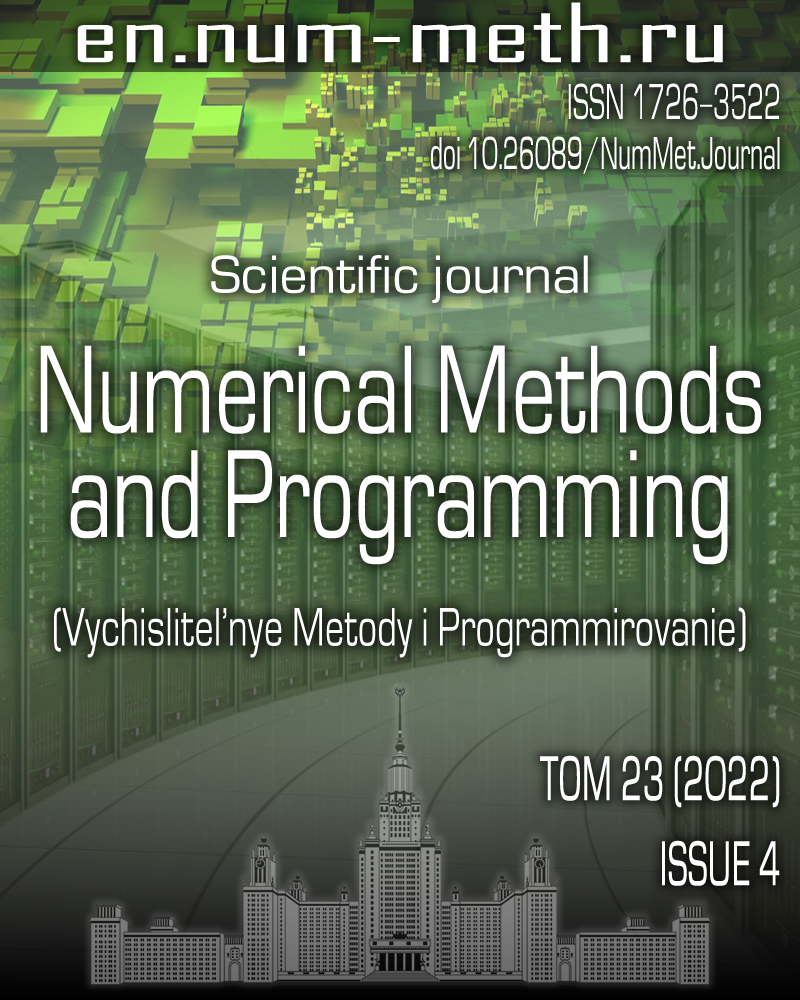DOI: https://doi.org/10.26089/NumMet.v23r421
On implementation of the parallel global optimization algorithm with the Intel oneAPI toolkit
Keywords:
Abstract
The paper considers the parallel global optimization algorithm and discusses its implementation with the Intel oneAPI toolkit. We suppose that the objective function is given as a black-box and satisfies the Lipschitz condition. The parallel algorithm presented in the paper uses the scheme of dimensionality reduction employing the Peano curve, which continuously maps an interval of the real axis onto a hypercube. The Intel oneAPI tools, that allows one to write the same code for both the central processor and the graphics accelerator, were used for implementation of the parallel global optimization algorithm. The results of numerical experiments obtained by solving a series of time-consuming multiextremal optimization problems are presented.
Published
Issue
Section
References
- D. C. Kutov, A. V. Sulimov, and V. B. Sulimov, “Supercomputer Docking: Investigation of Low Energy Minima of Protein-Ligand Complexes,” Supercomput. Front. Innovs. 5 (3), 134-137 (2018).
doi 10.14529/jsfi180326. - K. K. Abgaryan and M. A. Posypkin, “Optimization Methods as Applied to Parametric Identification of Interatomic Potentials,” Zh. Vychisl. Mat. Mat. Fiz. 54 (12), 1994-2001 (2014) [Comput. Math. Math. Phys. 54 (12), 1929-1935 (2014)].
doi 10.1134/S0965542514120021. - Yu. G. Yevtushenko, S. A. Lurie, M. A. Posypkin, and Yu. O. Solyaev, “Application of Optimization Methods for Finding Equilibrium States of Two-Dimensional Crystals,” Zh. Vychisl. Mat. Mat. Fiz. 56 (12), 2032-2041 (2016) [Comput. Math. Math. Phys. 56 (12), 2001-2010 (2016)].
doi 10.1134/S0965542516120083. - J. D. Pintér (Ed.), Global Optimization: Scientific and Engineering Case Studies (Springer, New York, 2006).
- I. Gubaydullin, L. Enikeeva, K. Barkalov, and I. Lebedev, “Parallel Global Search Algorithm for Optimization of the Kinetic Parameters of Chemical Reactions,” in Communications in Computer and Information Science (Springer, Cham, 2021), Vol. 1510, pp. 198-211.
doi 10.1007/978-3-030-92864-3_16 - Ya. D. Sergeev and D. E. Kvasov, Diagonal Methods of Global Optimization (Fizmatlit, Moscow, 2008) [in Russian].
- R. Paulavicius and J. Zilinskas, Simplicial Global Optimization (Springer, New York, 2014).
doi 10.1007/978-1-4614-9093-7. - R. G. Strongin and Ya. D. Sergeyev, Global Optimization with Non-Convex Constraints: Sequential and Parallel Algorithms (Springer, Berlin, 2000).
- Ya. D. Sergeyev, R. G. Strongin, and D. Lera, Introduction to Global Optimization Exploiting Space-Filling Curves (Springer, New York, 2013).
doi 10.1007/978-1-4614-8042-6. - R. G. Strongin, V. P. Gergel, V. A. Grishagin, and K. A. Barkalov, Parallel Computations in Global Optimization Problems (Mosk. Gos. Univ., Moscow, 2013) [in Russian].
- V. Sovrasov, “Comparison of Several Stochastic and Deterministic Derivative-Free Global Optimization Algorithms,” in Lecture Notes in Computer Science (Springer, Cham, 2019), Vol. 11548, pp. 70-81.
doi 10.1007/978-3-030-22629-9_6. - A. V. Boreskov, A. A. Kharlamov, N. D. Markovsky, et al., Parallel Computing on the GPU. Architecture and Programming Model of CUDA (Mosk. Gos. Univ., Moscow, 2015) [in Russian].
- A. S. Tanenbaum and T. Austin, Structured Computer Organization (Pearson, New York, 2006; Piter, Saint Petersburg, 2014).
- D. A. Komolov, R. A. Myalk, A. A. Zobenko, and A. S. Filippov, Computer-Aided Design Systems from Altera MAX+Plus II and Quartus II (RadioSoft, Moscow, 2002) [in Russian].
- V. Gergel, K. Barkalov, and A. Sysoyev, “Globalizer: A Novel Supercomputer Software System for Solving Time-Consuming Global Optimization Problems,” Numer. Algebra Control Optim. 8 (1), 47-62 (2018).
doi 10.3934/naco.2018003.
License
Copyright (c) 2022 К. А. Баркалов, И. Г. Лебедев, Я. В. Силенко

This work is licensed under a Creative Commons Attribution 4.0 International License.


